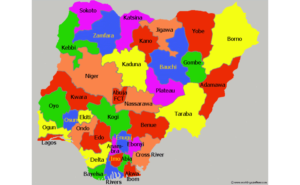Introduction
Nigeria, Africa’s largest economy and most populous nation, has become an attractive destination for real estate investment. With its rapidly growing population, increased urbanization, and rising middle class, the demand for residential and commercial properties continues to surge. For investors, the Nigerian real estate market offers a compelling mix of high returns, long-term stability, and protection against inflation.

In this article, we explore the “Top 10 Reasons Why Real Estate Investment in Nigeria”. It is not only profitable but also a smart choice for building long-term wealth. We will discuss key market trends, potential for growth, and the various advantages that make Nigeria’s real estate sector one of the most lucrative investment opportunities in Africa today.
1. Rapid Urbanization and Population Growth
Nigeria is Africa’s most populous country with a population of over 220 million people, and this number is projected to reach 400 million by 2050. As urbanization continues to accelerate, especially in cities like Lagos and Abuja, the demand for housing and commercial real estate will rise significantly, offering steady rental income and capital appreciation opportunities.
2. High Return on Investment (ROI)
The Nigerian real estate market has consistently shown high returns on investment. In Lagos, for instance, properties in high-demand areas like Lekki and Ikoyi can yield an annual ROI of 8-12%, which surpasses many other forms of investment such as stocks or bonds.
3. Growing Middle Class
With the expansion of Nigeria’s middle class, there is a rising demand for housing, particularly in urban areas. According to the National Bureau of Statistics, Nigeria’s middle class accounts for over 23% of the population, driving demand for residential properties and commercial spaces, ensuring constant rental returns.
4. Housing Deficit Presents Opportunities
Nigeria currently has a housing deficit of around 20 million units, according to a report by the Central Bank of Nigeria (CBN). This gap presents an enormous opportunity for real estate investors to bridge the supply-demand imbalance by developing new properties to meet the rising housing demand.
5. Favorable Demographics
Nigeria’s population is young and dynamic, with a median age of about 18. This youthful population is increasingly moving to cities, seeking employment and modern living arrangements. Investing in real estate can cater to this growing segment by providing affordable and sustainable housing.
.
6. Appreciating Land Value
In Nigeria, land typically appreciates in value over time. Prime areas in Lagos like Banana Island have seen a surge in land value by over 500% in the last decade, making land acquisition an excellent long-term investment. Even in emerging areas like Ibeju-Lekki, land values are rising rapidly due to ongoing infrastructural developments like the Dangote Refinery and Lekki Free Trade Zone.
7. Economic Diversification and Infrastructure Development
As Nigeria diversifies away from oil, the real estate sector benefits from increased government focus on infrastructure development. Initiatives like the Lagos-Ibadan Expressway and the Abuja-Kano railway project are enhancing connectivity, boosting real estate prices in surrounding areas.
8. Stable and Predictable Cash Flow
Real estate investments offer a stable and predictable income stream through rental properties. In fast-growing urban centers like Lagos and Abuja, the rental market is strong, providing investors with a steady cash flow. A typical 3-bedroom apartment in high-demand areas can generate rental income of ₦3-5 million annually.
9. Protection Against Inflation
Real estate has historically been a hedge against inflation. In Nigeria, where inflation rates can fluctuate, owning property ensures that the value of your investment increases over time protecting your capital. Rent and property values generally increase with inflation, ensuring that real estate investments outpace rising costs.
10. Government Incentives and Policies
The Nigerian government is promoting affordable housing and homeownership through initiatives like the Family Homes Fund and the National Housing Fund (NHF).
Investors can also benefit from incentives such as tax reliefs and low-interest mortgages, making it easier to acquire and develop properties.
Conclusion:
Real estate in Nigeria offers a wealth of opportunities for savvy investors, backed by rapid population growth, urbanization, and rising demand for housing. Whether you’re interested in residential properties, commercial developments, or land investments, the Nigerian market provides a robust platform for long-term profitability. At Silver Prime Realty Ltd, we are here to guide you through this exciting journey and help you make informed decisions for your real estate portfolio.
